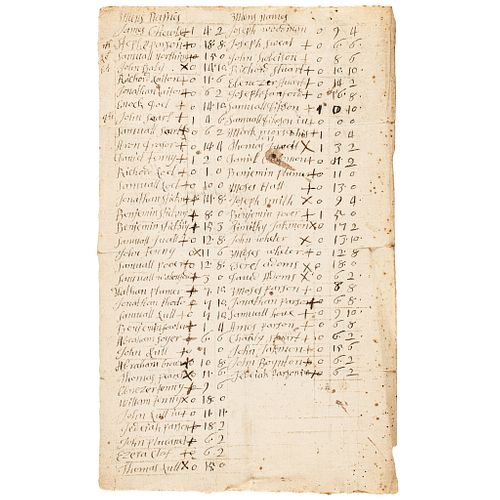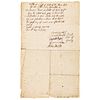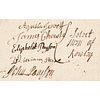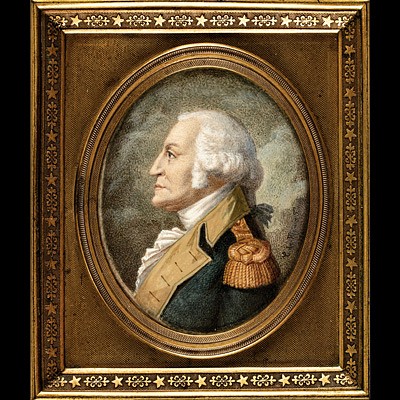1739 Tax Roster of the Men of Rowley, Massachusetts with Sixty-Three Mens Names
Lot 62
Estimate:
$400 - $500
Absentee vs Live bid
Two ways to bid:
- Leave a max absentee bid and the platform will bid on your behalf up to your maximum bid during the live auction.
- Bid live during the auction and your bids will be submitted real-time to the auctioneer.
Bid Increments
| Price | Bid Increment |
|---|---|
| $0 | $10 |
| $200 | $20 |
| $300 | $25 |
| $500 | $50 |
| $1,000 | $100 |
| $2,000 | $200 |
| $3,000 | $250 |
| $5,000 | $500 |
| $10,000 | $1,000 |
| $20,000 | $2,000 |
| $30,000 | $2,500 |
| $50,000 | $5,000 |
| $100,000 | $10,000 |
| $200,000 | $20,000 |
| $300,000 | $25,000 |
| $500,000 | $50,000 |
About Auction
By Early American History Auctions
May 22, 2021
Set Reminder
2021-05-22 12:00:00
2021-05-22 12:00:00
America/New_York
Bidsquare
Bidsquare : Autographs-Colonial-Political-Americana
https://www.bidsquare.com/auctions/early-american-history-auctions/autographs-colonial-political-americana-6913
302 Lots of Rare, Historic Autographs, Americana, Civil War Era, George Washington, Abraham Lincoln, Slavery & Black History, Revolutionary War Era, Colonial America, Federal Period, War of 1812, Colonial Currency, Indian Peace Medals & more... Early American History Auctions auctions@earlyamerican.com
302 Lots of Rare, Historic Autographs, Americana, Civil War Era, George Washington, Abraham Lincoln, Slavery & Black History, Revolutionary War Era, Colonial America, Federal Period, War of 1812, Colonial Currency, Indian Peace Medals & more... Early American History Auctions auctions@earlyamerican.com
- Lot Description
Colonial America
1739/40 "Mens Names" Rowley, Massachusetts Tax Roster
January 18, 1739/40-Dated Colonial American Era, Manuscript Document Signed, "Select Men of Rowley," with Sixty-Three "Mens Names" on the Tax Roster for Rowley, (Massachusetts), Very Fine.
January 18, 1739/40 Colonial Document Signed by five Selectmen of the town of Rowley, Massachusetts. This 12" tall x 7.25" wide official Document is nicely presented on clean laid period paper. It lists the names of 63 Men and the taxes owed by each of them. Rowley, Massachusetts being a town in this English colony, it is not surprising to see the taxes listed in Pounds, Shillings, and Pence. The heaviest Tax (1 Pound, Five Shillings) was owed, ironically, by a man named Benjamin Pooer. The least amount of tax (none) was owed by Samuel Dikoson, Jr. This tax list was handed over to the Constable, Samuel Poore, for collection. His marks appear at the left of the taxes due on each named man's line. Some are marked with a "+" sign; others are marked with an "X", but it is unclear what each symbol means (collected or still owed?). A rarely encountered, scarce important and interesting piece of Colonial American fiscal and tax history.
Rowley is a town in Essex County, Massachusetts, United States. The population was 5,856 at the 2010 census.
In spring of 1639 Rowley was originally settled as a plantation by Reverend Ezekiel Rogers, who had arrived from England on the ship John of London with approximately twenty families. The John of London also brought over the first printing press in the colonies, which was later brought to Harvard University.
The following spring, on September 4, 1639, the town was incorporated, and included portions of modern-day Byfield, Groveland, Georgetown, and Haverhill. The town was named after Rowley, East Riding of Yorkshire, where Rogers had served as pastor for twenty years before his suspension due to non-conformist Puritan beliefs. Rogers was installed as Rowley's pastor on December 3.
1643 and 1645 saw the construction of a fulling mill and grist mill, respectively. The town became known for its hemp and flax cloth, as well as cotton. In 1642, a keystone arch bridge and a dam were built on the Mill River for the fulling mill, the first such in the colonies. The bridge was the first stone arch bridge in North America, constructed entirely of hand-chiseled granite and contained no mortar. It was rebuilt in the mid-19th century. In 1669, a sawmill was established in town and is still in business today. A wagon factory was built in 1868 by Moses E. Daniels. Later, at the start of the 20th century, the town had a booming shoe industry, as well as successful boat building businesses.
Many colonial homes line Rowley's streets, mixed in with a variety of architectural styles from all throughout American history. The town common (historically called the training place), is surrounded by many simple yet graceful old homes. It was at the training place where Benedict Arnold's expedition to Quebec encamped in 1775, during the American Revolution.
Our Auction Contents:
Black History & Slavery: (Lots 1 - 63)
Abraham Lincoln Related: (Lots 64 - 74)
Historic Autographs: (Lots 75 - 235)
Colonial America: (Lots 236 - 261)
Revolutionary War: (Lots 262 - 304)
George Washington Related: (Lots 305 - 306)
Early American Guns & Weapons: (Lots 307 - 318) - Shipping Info
-
Early American provides in-house worldwide shipping. Please contact us directly if you have questions about your specific shipping requirements.
-
- Buyer's Premium



 EUR
EUR CAD
CAD AUD
AUD GBP
GBP MXN
MXN HKD
HKD CNY
CNY MYR
MYR SEK
SEK SGD
SGD CHF
CHF THB
THB













